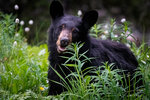Partly Cloudy, 46° F
A majority of Wyoming residents are worried about environmental conservation in the state, viewing issues like low levels in rivers, the loss of pollinators, and the loss of natural spaces as serious …
This item is available in full to subscribers.
The Powell Tribune has expanded its online content. To continue reading, you will need to either log in to your subscriber account, or purchase a subscription.
If you are a current print subscriber, you can set up a free web account by clicking here.
If you already have a web account, but need to reset it, you can do so by clicking here.
If you would like to purchase a subscription click here.
Please log in to continue |
|



A majority of Wyoming residents are worried about environmental conservation in the state, viewing issues like low levels in rivers, the loss of pollinators, and the loss of natural spaces as serious problems in the state. Yet Wyoming voters differ from most of the states surveyed in a regional poll in several categories, including being near the bottom of the list claiming climate change is a serious problem.
The results of the 14th annual Colorado College State of the Rockies poll shows “a clear and resounding preference for conservation when Wyoming voters are given a choice over how public lands are used and that those issues play a key role in who voters will support in the 2024 elections,” said Katrina Miller-Stevens, director of the State of the Rockies Project and an associate professor at Colorado College.
“There may be a lot that divides voters across the country, but in Wyoming there is nearly universal consensus in favor of conservation,” Miller-Stevens said. “Not only do voters prefer conservation when asked how public lands and water should be utilized, but issues involving water, air, land and wildlife are top of mind when they make their voting decisions.”
The poll, which surveyed the views of voters in Wyoming and seven other Mountain West states including Arizona, Colorado, Idaho, Montana, Nevada, New Mexico and Utah, found 58% of Wyoming voters are worried about the future of land, water and wildlife.
The poll also shows the majority of voters in Wyoming view issues like low levels in rivers, the loss of pollinators, and the loss of natural spaces as extremely or very serious problems in their state, while nearly half (46%) of voters now think the effects of climate change in their state over the past 10 years are significant.
Compared to other issues like the economy, health care and education, a vast majority of Wyoming voters (84%) say issues involving clean water, clean air, wildlife and public lands are important in deciding whether to support an elected official. More than a third of respondents said those issues are the primary factor in deciding whether to support an elected official.
Somewhat surprisingly, 51% of voters polled said they prefer congressional representatives place more emphasis on ensuring we protect sources of clean water, air quality and wildlife habitats while providing opportunities to visit and recreate on public lands in upcoming decisions. That is compared to just 44% of voters who would rather ensure more domestic energy production by maximizing the amount of public lands available for responsible oil and gas drilling and mining.
Not surprisingly considering previous State of the Rockies poll results, 69% of Wyoming voters want more emphasis placed on conserving wildlife migration routes, providing highway crossings, and limiting more development to protect wildlife habitats, compared to 28% of voters who want more emphasis on economically productive uses of land such as new development, roads, ranching, or oil and gas production.
As seen in Conservation in the West Poll results from previous years, public lands and the outdoors continue to play an important role in Wyoming lifestyles. About eight in 10 voters say they visited national public lands three or more times in the past year, compared to only 6% who did not visit national public lands.
An overwhelming amount of respondents (95%) say spending more time outdoors helps counter growing rates of anxiety, depression and mental health problems in young people.
“The deep connection between Wyomingites and the outdoors, along with the importance placed on protecting public lands, are reflected in strong support for a variety of conservation policies among Wyoming voters,” the report on results said.
Wyoming voters were overwhelmingly in favor of a number of conservation issues. Among those, 89% support requiring oil and gas companies, rather than federal and state governments, to pay for all of the clean-up and land restoration costs after drilling is finished; 88% support constructing wildlife crossing structures across major highways that intersect with known migration routes; 82% support managing public lands to ensure there are more outdoor places free of light pollution to better see the stars at night.
However, Wyoming voters, while still in the majority for the state, were the least concerned of the western states in support of the 30x30 campaign. Less than 65% support the national goal of conserving 30% of land and inland waters in America, and 30% of its ocean areas, by the year 2030. And 70% support creating new national parks, national monuments, national wildlife refuges and tribal protected areas to protect historic sites or areas for outdoor recreation.
While both are a clear majority, Wyoming is a full 12% behind the eight-state average for support of 30x30 and 14% behind the average on protecting historic sites or areas for outdoor recreation. Wyoming is also, according to the poll, only behind Idaho as the state least concerned about climate change, although still close to 38% of voters polled said climate change is an extremely or very serious problem.
The 2024 Colorado College Conservation in the West Poll is a bipartisan survey conducted by Republican pollster Lori Weigel of New Bridge Strategy and Democratic pollster Dave Metz of Fairbank, Maslin, Maullin, Metz & Associates. The survey is funded by the William and Flora Hewlett Foundation.
The poll surveyed at least 400 registered voters in each of the eight Western states for a total 3,413-voter sample, which included an over-sample of Black and Native American voters. The survey was conducted between Jan. 4-21 and the effective margin of error is plus-2.4% at the 95% confidence interval for the total sample; and at most plus-4.9% for each state.
The full survey and individual state surveys are available on the State of the Rockies Project website: coloradocollege.edu/other/stateoftherockies/conservationinthewest/2024.html.